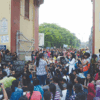Letter from the Editor
In EducationWorld, our mission statement formulated on the eve of the new millennium, a time of universal euphoria and great expectations, was — and remains — to build the pressure of public opinion to make education the # 1 item on the national agenda. We believe that developing human capital is the most important priority for lifting the majority of the country’s population steeped in backwardness and despair, out of poverty. Although a no-brainer, shockingly this self-evident proposition is not universally accepted, even to this day. Ab initio after India became an independent nation 70 years ago, education was placed way down on the list of national priorities. Annual expenditure (Centre plus states) on public education which should have been 10 percent of GDP, has never exceeded 4 percent.
The neglect of education — especially rural primary-secondary education — has exacted a terrible price from the citizens of free India. The population has tripled and industry and agriculture productivity is among the lowest worldwide. And to this day, illiterate and quasi-literate farmers burdened with illiteracy, penury and despair are killing themselves by the thousands. Last year, 56,000 committed suicide — one every 40 minutes.
Against this dismal backdrop, one would expect the Central and state governments to focus their attention on repairing the country’s 1.40 million government primary-secondary schools defined by crumbling buildings, teacher absenteeism, poor curriculums and lack of toilets, drinking water and often, electricity. Instead, official — and judicial — attention is focused on ‘regulating (reducing) the tuition and other fees of the country’s independent private schools, the too-few islands of excellence in a sea of government-controlled education institutions. Egged on by the subsidies-addicted middle class which aspires to first world education at third world prices, governments are interfering with the self-administration of all private schools by imposing tuition fees ceilings and other restrictions. In protest against this development, we have written our second cover story of the past six months warning of the dangers of government interference which could well be the beginning of the end of K-12 private independent schools which routinely top the annual EducationWorld India School Rankings, and attract students from around the world. Post-independence India’s record on preserving and maintaining its great institutions is abysmal. All right-thinking members of society need to cooperate to ensure our great independent schools aren’t added to the list.
One of the great achievements of this publication is that we have impacted the vital importance of professionally delivered early childhood care and education (ECCE) on the national mindset. In this issue, we report on the eighth successive EducationWorld National Early Childhood Education Conference 2018, which attracted over 300 of the country’s top ECCE professionals. During this star-studded national conference, we also celebrated the country’s best pre-primaries top-ranked in our EducationWorld nationwide poll, the results of which were published in December (see Pictorial Essay).
















Add comment